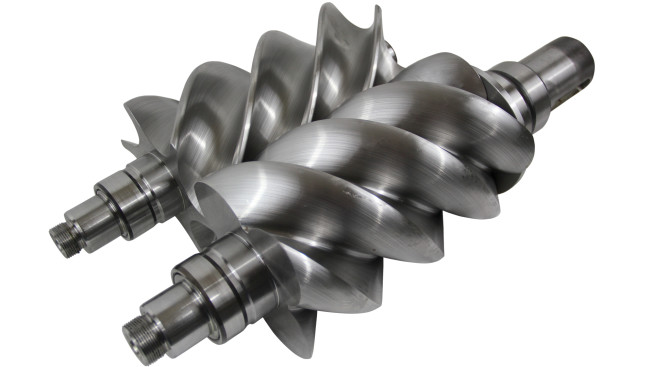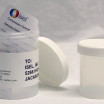
Unlike most other lubricated components, rotary screw air compressors face a unique triple threat to their life span: A constant influx of excessive heat, oxygen and water. Any one of these three forces can degrade a lubricant and lead to equipment problems. In a rotary screw air compressor, all three are continuously present — increasing the challenge of proper lubrication and protection. Overcoming this triple threat requires:
- Oil analysis on a regular basis
- Timely oil change-outs
- Enhanced control over lubricant contamination
Where The Threats Stem From
Heat, oxygen and water all contribute to oxidation of a lubricant. Oxidation shortens the fluid’s service life, increasing the risk of inadequate lubrication and, consequently, the potential for equipment damage or failure.
With a rotary screw air compressor, the inlet air brings substantial oxygen in contact with the lubricant. Compression of air causes moisture (humidity from the atmosphere) to condense in the oil. This air compression also generates heat.
Many of today’s high-quality air compressor lubricant formulations are capable of withstanding extreme temperatures and utilize advanced additives to help ward off the effects of water, oxygen and other harmful forces. They offer longer fluid life than prior generations of air compressor oils.
But no lubricant can last forever. Eventually, oxidation will degrade the fluid, and harmful acidic byproducts will form and potentially damage metal compressor parts.
A Snowball Effect
Oxidation can be monitored through oil analysis and, specifically, by tracking the lubricant’s total acid number (TAN). A fluid’s TAN generally rises with the degree of oxidation and fluid degradation. Conventional wisdom might suggest that draining and replacing the oil whenever the TAN reaches a target limit (typically 2.0) would take care of the problem. Unfortunately, that’s not enough.
In a standard oil drain, it is estimated that as much as 15%-20% of the old fluid can remain in the system, immediately contaminating the new fluid. As a result, the replacement oil may oxidize more quickly — and have a significantly shorter service life — than the oil it has replaced.
In fact, with each oil-drain interval, the contaminants from residual oil from all prior change-outs amass, having an increasing impact on the new fluid. So with each oil drain, the new fluid oxidizes faster and faster, with TAN levels escalating rapidly into double digits.
Oil drains must take place at an increasing frequency in a struggle to combat the problem. It’s a vicious cycle that wastes oil and money through excessive maintenance costs and productivity-depleting downtime.
In addition, when TAN levels are well above acceptable levels, other harmful consequences are more prone to happen:
- Rust and corrosion accelerate
- Sludge and varnish form more quickly
- Separators and filters can become blocked
These and other issues may lead to compressor failure. That translates into extensive downtime and costs for repair or replacement of equipment, as well as more loss of productivity.
Overcoming The Problem
The entire snowball-effect scenario can be avoided through a combination of:
- Timely TAN monitoring through oil analysis at recommended intervals
- A strong focus on cleanliness
Oil drains should take place before TAN levels reach abnormal levels so that harmful oxidation-related byproducts do not have a chance to accumulate. During oil drains, ensure that:
- The oil is drained thoroughly
- System components are cleaned to remove as much residual oil and contaminants as possible
- Pumps and other equipment used to transfer new lubricant into the compressor are clean and free of old oil
- Unused lubricant is always stored in clean containers
These procedures will help minimize contamination of the lubricant, prolonging its service life as well as that of the compressor it lubricates.
Isel Can Help
Isel’s air compressor lubricants are your ideal solution, formulated to withstand the punishing temperatures and pressures inherent to modern air compressors. These fluids offer unmatched performance, protection and fluid life, and are all rated at 100% fluid life at 212°F (100°C) — well above the industry norm. They also provide superior demulsibility (water separability) over the competition, as well as wear protection that will not diminish fluid life and will not corrode components. These features all help slow the pace of oxidation and promote longer service life.
In addition, Isel offers complimentary oil analysis with all of our lubricants for as long as you use them. This service, combined with your own proper maintenance program, will help ensure that you get the most out of the lubricants you use and the compressors you use them in.
For more information about Isel’s air compressor lubricants and services, contact us today.
Did You Know …?
For every 20°F increase (or 11°C increase) in operating temperature beyond the temperature for which a lubricant is rated for full fluid life, the lubricant’s actual operating life is cut approximately in half.
Therefore, if an economical air compressor lubricant is rated for 8,000 hours at 180°F (82°C), it will last only about 4,000 hours at today’s common operating temperature of 200°F (93°C).
Isel’s air compressor lubricants are all rated at 100% fluid life at 212°F (100°C) for unsurpassed fluid life — even in extreme temperatures.
Relevant Entries in this Category that May Interest You:
Isel is Now Part of DuBois Chemicals!
In 2020, Isel joined the DuBois Chemicals team! DuBois/Isel is proud to continue the tradition of manufacturing refrigeration solutions specializing in...
Read MoreISEL to exhibit at Best Practices Compressed Air EXPO – 2021
Visit ISEL at the Best Practices Compressed Air EXPO which is held at the Renaissance Schaumburg Convention Center Hotel in...
Read MoreMAKE-A-WISH TURNS 40 AND ISEL SHOWS THEIR SUPPORT
April 2020 On April 29, 1980, the first wish was granted. A seven-year-old boy who yearned to be a police...
Read More
